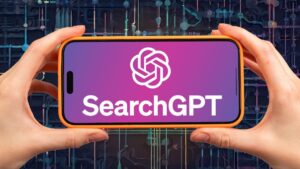
OpenAI has introduced a groundbreaking innovation: SearchGPT. This latest venture expands the boundaries of artificial intelligence, moving beyond conversational AI to a fully functional search engine designed to optimize information retrieval and user experience. Let’s dive into what access to SearchGPT offers, its release details, and how users can benefit from—and critically evaluate—this new tool.
What is SearchGPT?
SearchGPT is an AI-driven search engine developed by OpenAI. Leveraging the robust capabilities of the ChatGPT framework, SearchGPT aims to provide users with more accurate, context-aware search results. Unlike traditional search engines that rely heavily on keyword matching and ranking algorithms, SearchGPT uses natural language understanding to interpret queries and deliver more precise, contextually relevant information.
Release Date and Accessibility
SearchGPT was officially launched on 11-1-2024, making it accessible to a broad audience. Users can access it through OpenAI’s platform or via integration with various web browsers and applications. To use SearchGPT, users need to create an OpenAI account or log in with their existing credentials. Additionally, OpenAI offers API access for developers looking to integrate SearchGPT’s capabilities into their own applications and services.
How to Access SearchGPT
Getting started with SearchGPT is straightforward:
- Visit the Platform: Navigate to OpenAI’s official website or the dedicated SearchGPT page.
- Create an Account: If you’re a new user, sign up for an OpenAI account. Existing users can log in with their current credentials.
- Start Searching: Enter your query in natural language, and let SearchGPT provide results tailored to your needs.
- Integration Options: Developers can access the API documentation to integrate SearchGPT into their applications.
The Positives of SearchGPT
1. Enhanced Contextual Understanding
One of the standout features of SearchGPT is its ability to understand the context behind user queries. This capability allows it to deliver results that are more aligned with the user’s intent, reducing the need for multiple searches and refining the overall search experience.
2. Conversational Interface
SearchGPT maintains a conversational style, making interactions feel more natural and intuitive. Users can ask follow-up questions without rephrasing their initial queries, fostering a smoother, more efficient search process.
3. Personalization
SearchGPT can learn from user interactions to provide more personalized results over time. This feature enhances the relevance of search outcomes, particularly for users who frequently engage with the platform.
4. Integration Capabilities
The availability of API access opens doors for developers to incorporate SearchGPT into various applications, from customer service chatbots to educational platforms, expanding its utility beyond standalone search functions.
The Drawbacks of SearchGPT
1. Data Privacy Concerns
As with any AI-driven tool, data privacy is a significant consideration. SearchGPT collects and processes user data to refine its responses, which raises questions about how this data is stored, used, and protected. Users need transparency about data handling practices and should be vigilant about sharing sensitive information.
2. Dependence on AI Interpretation
While SearchGPT’s natural language processing capabilities are advanced, they are not infallible. There may be instances where the AI misinterprets a query, leading to less accurate or irrelevant results. This issue can be particularly problematic for complex or nuanced queries.
3. Learning Curve
Although SearchGPT aims to provide a user-friendly experience, some users might find the transition from traditional search engines to an AI-driven one challenging. Familiarizing oneself with the new interface and understanding how to phrase queries effectively might require a bit of a learning curve.
4. Potential Bias
AI models, including SearchGPT, can inadvertently reflect biases present in the data they were trained on. This risk highlights the importance of ongoing monitoring and updates to ensure fair and unbiased search results.
The Future of Search with SearchGPT
The launch of SearchGPT marks a significant milestone in the evolution of search technology. As AI continues to develop, the potential for more refined and intelligent search capabilities grows. OpenAI’s commitment to innovation suggests that SearchGPT will evolve, incorporating user feedback and advancing its features to meet the dynamic needs of its audience.
For users interested in trying out this new search engine, it’s worth exploring the benefits while staying mindful of the challenges. By critically engaging with SearchGPT, users can maximize its advantages while contributing to its refinement and ethical use.
Conclusion
Access SearchGPT today to experience a new frontier in AI-driven search technology. Whether you’re a casual user or a developer looking to integrate advanced search capabilities, SearchGPT offers a unique blend of personalization, contextual understanding, and conversational interaction. As with any tool, it’s essential to approach it with a balanced perspective, recognizing both its potential and its limitations. Happy searching!


